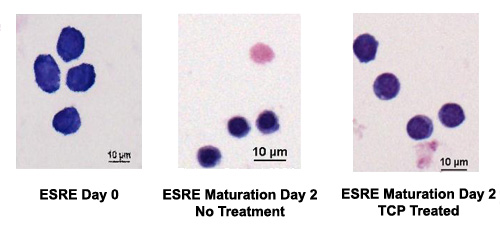Pediatrics / Steiner Lab / Current Research Projects / The Role of Chromatin Modifiers in Erythroid Maturation
Investigation into the Role of Chromatin Modifiers in Erythroid Maturation using Genome-Wide Technologies and Functional Assays

Treatment of Extensively Self Renewing Erythroblasts (ESREs) with the LSD1 inhibitor Tranylcypromine (TCP), leads to impaired maturation of these cells.
The molecular mechanisms that drive the maturation of a committed erythroid progenitor to a functional red blood cell are incompletely understood. LSD1 (Lysine-Specific Histone Demethylase 1) is a widely expressed histone demethylase that also indirectly influences DNA methylation. LSD1 is critical for erythroid maturation and is involved in both globin switching and leukemogenesis.
The goal of this project is to elucidate the molecular mechanisms by which LSD1 regulates erythroid maturation. To gain a comprehensive understanding of how this ubiquitously expressed chromatin modifier influences erythroid gene expression, we are investigating the role of LSD1 in establishing multiple mechanisms of epigenetic regulation, as well as delineating the structure and function of specific sites of LSD1 binding.
These studies will provide insights into pathways important in human disease, and will enhance our understanding of how a ubiquitously expressed chromatin modifier exerts cell-type specific effects.